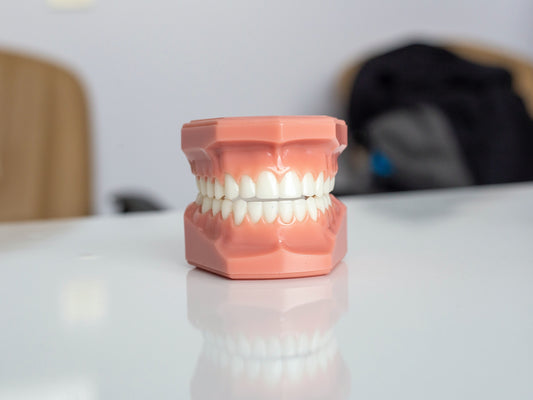Do you ever struggle with poor sleep? Do you lie awake for hours or wake up (and stay awake) in the middle of the night?
Many people who experience sleep difficulties swear by adding melatonin to their nighttime routine. It’s a hormone that can help improve sleep and regulate your circadian rhythm through receptors in your brain. Before you give it a try, though, it’s understandable that you might want answers to questions about how it works and how long it lasts.
If this is the case for you, read on to learn everything you need to know.
What Is Melatonin?
Many people are surprised to learn that melatonin is a hormone [1]. The brain produces it as a response to darkness.
The production of melatonin plays an important role in the timing of our circadian rhythms (our 24-hour internal clocks). It also supports deep, restful sleep.
Melatonin is also sold as a dietary supplement. If you’re struggling with your sleep quality, taking a melatonin supplement on occasion can be useful.
How Does Melatonin Work?
In addition to regulating circadian rhythms, melatonin influences several other bodily processes.
For example, it regulates body temperature, blood pressure, and certain hormone levels, including dopamine, which is linked to increased alertness [2,3,4]. It binds to receptors in the brain, too, to reduce nervous system activity and promote relaxation [5].
Benefits of Taking Melatonin
Does melatonin work? There’s quite a bit of research that suggests it does, especially when it comes to sleep. Here are some of the top benefits melatonin has to offer:
Better Sleep Quality
Of course, the primary benefit of melatonin is improved sleep. Many studies have shown that it’s an effective and safe option for those struggling with insomnia.

One meta-analysis (a review of several studies) evaluated 19 different studies on melatonin and found that it can help children and adults to reduce their sleep latency (the amount of time it takes to fall asleep), increase their total sleep time, and improve their overall sleep quality [7].
Another great thing about melatonin is that it is not as intense as some other sleep aids, making melatonin a moderate option to try first if struggling with sleep (with a doctor’s approval, of course) [8].
Better Mood
Do you struggle with Seasonal Affective Disorder (also known as SAD or seasonal depression)? If so, you may want to talk to your doctor about adding melatonin into your routine.
Light changes brought on by changing seasons (i.e., getting darker earlier in the day) may throw off your circadian rhythms, impede your sleep quality, and increase your depressive symptoms. However, research shows that melatonin can help to reduce these symptoms so you can make it through the winter [9].
Increased Muscle Growth
A few small-scale studies have shown that melatonin may increase levels of human growth hormone (or HGH).
Human growth hormone plays an important role in muscle growth and building strength. That’s why sleep is such a key component in proper post-workout recovery.
Two recent studies, one that observed 8 participants and one that observed 32 participants, both showed that melatonin could increase HGH levels [10,11]. While more research is needed to confirm these conclusions, it’s promising for those looking to increase muscle from gym workouts.
Improved Eye Health
Melatonin is a rich source of antioxidants, including antioxidants that prevent cell damage and support healthy eyes. Research shows that long-term melatonin supplementation can help to protect the retina (the tissue that lines the back of the eye) and delay age-related eye damage [12].
When to Take Melatonin
When is the best time to take melatonin? In general, most sleep experts recommend taking melatonin about 30-60 minutes before they head to bed [13].
On average, it takes about 30 minutes for melatonin levels in the blood to rise and for the supplement to take effect. Some people will absorb it more slowly than others, though, so taking it earlier may be a better choice.

Keep in mind, you may need to experiment a bit to figure out the appropriate timing for your melatonin supplementation. Start by taking it 30 minutes before bed, then move the time back a bit if needed.
Remember, too, that it’s better to take melatonin earlier rather than later. If you take it right before you go to bed or after your preferred bedtime, you may find that you feel groggy when you wake up in the morning.
How Much Melatonin Should You Take?
Most melatonin supplements are typically sold in doses ranging from 0.5 to 5 milligrams [14]. As a general rule, it’s best to start with the lowest dose possible. Remember to always check in with your doctor before starting to understand your needs & medical history.
How Long Does Melatonin Last?
Melatonin is not a long-lasting supplement. Its half-life is about 40-60 minutes long [15]. This means that half of the supplement is eliminated from your body without 40-60 minutes of consuming it.
On average, it takes about 5 hours for your body to fully eliminate melatonin after you’ve taken it. That’s why it’s not recommended that you drive or use heavy machinery within 5 hours of using it.
Everyone’s body is different when it comes to metabolizing melatonin. There are lots of factors that can contribute, including the following [16]:
- Age
- Caffeine consumption
- Tobacco consumption
- General health status
- Body composition
- Frequency of melatonin use
This last point is particularly important. If you regularly take melatonin, you might find that it doesn’t last as long, or that you need to take a higher dose to experience the same effect.
How Long Does It Take for Melatonin to Work?
On average, most people find that it takes about 30-60 minutes for melatonin to take effect and help them start feeling sleepy. The specific amount of time it takes to induce sleepiness varies, though, depending on whether you take an extended-release supplement or a regular one.
Extended-release melatonin supplements take longer to take effect than regular melatonin supplements, which instantly release melatonin into the bloodstream as soon as they begin to dissolve.
Extended-release melatonin gradually releases melatonin into the bloodstream (hence the name). It may take a bit longer to take effect. However, some people prefer this type of supplement because it mimics the way melatonin is naturally released by the body throughout the night. They find that it helps them to stay asleep longer, too.
Common Melatonin Side Effects
Most people do not experience any side effects (outside of a little daytime drowsiness if they take it too late) when they use melatonin. However, some potential (mild) effects have been documented, including the following [17]:
- Headaches
- Dizziness
- Nausea
Some other side effects are less common, including mild anxiety and tremors. Some people have also reported nightmares and temporary feelings of depression, too.
If you’re not sure if melatonin is right for you, talk to your doctor. They can assess your medical history and help you make a safe and informed decision.
How Long Should You Take Melatonin?
For the most part, melatonin seems to be safe. However, many medical professionals still recommend cycling on and off of it, rather than taking it on a nightly basis for months at a time.

According to a sleep expert from Johns Hopkins University, it’s a good idea to take melatonin for a month or two, then take a break to see how your sleep quality is without it. This can help you avoid developing a dependence [18].
Try Melatonin Today
Are you ready to say goodbye to sleep problems? Now that you have more information about melatonin, it’ll be easier for you to decide whether or not it’s the right sleep aid for you.
If you do decide to try melatonin, keep the facts outlined above in mind. They’ll help you ensure you’re using it correctly so you can see great results.
















